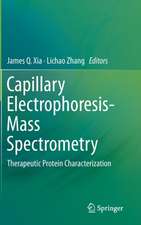Proteomic Methods in Neuropsychiatric Research: Advances in Experimental Medicine and Biology, cartea 974
Editat de Paul C. Guesten Limba Engleză Hardback – 4 apr 2017
The volume will be of high interest to clinical scientists, physicians and pharmaceutical company scientists as it gives insights into the latest technologies enabling the revolution of personalized medicine. It is of direct interest to both technical and bench biomarker scientists as it gives step by step instructions on how to carry out each of the protocols. It is also of interest to researchers as each technique will be presented in the context of a specific neurological disorder, including Alzheimer's disease, multiple sclerosis, autism spectrum disorders, schizophrenia, major depressive disorder and bipolar disorder.
Finally, it will also highlight the future research efforts in this field, which are endeavoring to convert proteomic platforms to the form of hand held devices which can be used in a point of care setting and return diagnostic results within the timeframe of a visit to the general practitioner.
| Toate formatele și edițiile | Preț | Express |
|---|---|---|
| Paperback (1) | 1003.07 lei 6-8 săpt. | |
| Springer International Publishing – 21 iul 2018 | 1003.07 lei 6-8 săpt. | |
| Hardback (1) | 1009.22 lei 6-8 săpt. | |
| Springer International Publishing – 4 apr 2017 | 1009.22 lei 6-8 săpt. |
Din seria Advances in Experimental Medicine and Biology
- 9%
 Preț: 719.60 lei
Preț: 719.60 lei - 20%
 Preț: 691.93 lei
Preț: 691.93 lei - 5%
 Preț: 717.00 lei
Preț: 717.00 lei - 5%
 Preț: 716.28 lei
Preț: 716.28 lei - 5%
 Preț: 717.20 lei
Preț: 717.20 lei - 15%
 Preț: 640.24 lei
Preț: 640.24 lei - 5%
 Preț: 1113.83 lei
Preț: 1113.83 lei - 5%
 Preț: 715.71 lei
Preț: 715.71 lei - 5%
 Preț: 820.43 lei
Preț: 820.43 lei - 15%
 Preț: 641.38 lei
Preț: 641.38 lei - 5%
 Preț: 716.28 lei
Preț: 716.28 lei - 5%
 Preț: 523.99 lei
Preț: 523.99 lei - 5%
 Preț: 1031.00 lei
Preț: 1031.00 lei - 5%
 Preț: 717.00 lei
Preț: 717.00 lei - 5%
 Preț: 715.35 lei
Preț: 715.35 lei - 20%
 Preț: 1161.71 lei
Preț: 1161.71 lei - 5%
 Preț: 1170.51 lei
Preț: 1170.51 lei - 18%
 Preț: 1119.87 lei
Preț: 1119.87 lei - 5%
 Preț: 1288.48 lei
Preț: 1288.48 lei - 5%
 Preț: 1164.67 lei
Preț: 1164.67 lei - 5%
 Preț: 1101.73 lei
Preț: 1101.73 lei - 18%
 Preț: 1123.67 lei
Preț: 1123.67 lei - 5%
 Preț: 1435.64 lei
Preț: 1435.64 lei - 20%
 Preț: 1044.10 lei
Preț: 1044.10 lei - 18%
 Preț: 946.39 lei
Preț: 946.39 lei - 5%
 Preț: 292.57 lei
Preț: 292.57 lei - 18%
 Preț: 957.62 lei
Preț: 957.62 lei - 18%
 Preț: 1235.76 lei
Preț: 1235.76 lei - 5%
 Preț: 1231.55 lei
Preț: 1231.55 lei - 5%
 Preț: 1292.30 lei
Preț: 1292.30 lei - 5%
 Preț: 1102.10 lei
Preț: 1102.10 lei - 18%
 Preț: 1132.81 lei
Preț: 1132.81 lei - 5%
 Preț: 1165.19 lei
Preț: 1165.19 lei - 5%
 Preț: 1418.48 lei
Preț: 1418.48 lei - 5%
 Preț: 1305.63 lei
Preț: 1305.63 lei - 18%
 Preț: 1417.72 lei
Preț: 1417.72 lei - 18%
 Preț: 1412.99 lei
Preț: 1412.99 lei - 24%
 Preț: 806.16 lei
Preț: 806.16 lei - 18%
 Preț: 1243.29 lei
Preț: 1243.29 lei - 5%
 Preț: 1429.44 lei
Preț: 1429.44 lei - 5%
 Preț: 1618.70 lei
Preț: 1618.70 lei - 5%
 Preț: 1305.12 lei
Preț: 1305.12 lei - 18%
 Preț: 1124.92 lei
Preț: 1124.92 lei - 5%
 Preț: 1097.54 lei
Preț: 1097.54 lei - 15%
 Preț: 649.87 lei
Preț: 649.87 lei - 5%
 Preț: 1097.54 lei
Preț: 1097.54 lei - 18%
 Preț: 945.79 lei
Preț: 945.79 lei - 5%
 Preț: 1123.16 lei
Preț: 1123.16 lei
Preț: 1009.22 lei
Preț vechi: 1230.76 lei
-18% Nou
Puncte Express: 1514
Preț estimativ în valută:
193.14€ • 200.89$ • 159.45£
193.14€ • 200.89$ • 159.45£
Carte tipărită la comandă
Livrare economică 14-28 aprilie
Preluare comenzi: 021 569.72.76
Specificații
ISBN-13: 9783319524788
ISBN-10: 331952478X
Pagini: 381
Ilustrații: XII, 370 p. 55 illus., 45 illus. in color.
Dimensiuni: 155 x 235 x 22 mm
Greutate: 0.71 kg
Ediția:1st ed. 2017
Editura: Springer International Publishing
Colecția Springer
Seriile Advances in Experimental Medicine and Biology, Proteomics, Metabolomics, Interactomics and Systems Biology
Locul publicării:Cham, Switzerland
ISBN-10: 331952478X
Pagini: 381
Ilustrații: XII, 370 p. 55 illus., 45 illus. in color.
Dimensiuni: 155 x 235 x 22 mm
Greutate: 0.71 kg
Ediția:1st ed. 2017
Editura: Springer International Publishing
Colecția Springer
Seriile Advances in Experimental Medicine and Biology, Proteomics, Metabolomics, Interactomics and Systems Biology
Locul publicării:Cham, Switzerland
Cuprins
Preface – Proteomic studies in psychiatric disease and neurological disorders.- Part 1: REVIEWS.- Application of proteomic techniques for improved stratification and treatment of schizophrenia patients.- Multiplexing biomarker methods, proteomics and considerations for Alzheimer’s disease.- What have proteomic studies taught us about novel drug targets in autism?.- Application of proteomic approaches to accelerate drug development for psychiatric disorders.- Proteomic biomarker identification in cerebrospinal fluid for leptomeningeal metastases with neurological complications.- Connecting brain proteomics with behavioural neuroscience in translational animal models of neuropsychiatric disorders.- LC-MSE for qualitative and quantitative proteomicstudies of psychiatric disorders.- The utility of multiplex assays for identification of proteomic signatures in psychiatry.- Part 2: PROTOCOLS.- Blood sampling and preparation procedures for proteomic biomarker studies of psychiatric disorders.- Multiplex immunoassay profiling of serum in psychiatric disorders.- Sequential immunopreciptation of secretory vesicle proteins from biosynthetically-labelled cells.- 2d gel electrophoresis of insulin secretory granule proteins from biosynthetically-labelled pancreatic islets.- Two-dimensional gel electrophoresis: a reference protocol.- A two-dimensional difference gel electrophoresis (2D-DIGE) protocol for studies of neural precursor cells.- Identifying biomarker candidates in the blood plasma or serum proteome.- Selective reaction monitoring mass spectrometry for quantitation of glycolytic enzymes in post-mortem brain samples.- A selected reaction monitoring mass spectrometry protocol for validation of proteomic biomarker candidates in studies of psychiatric disorders.- Application of iTRAQ shotgun proteomics for measurement of brain proteins in studies of psychiatric disorders.- Co-immunoprecipitation for deciphering protein interactomes.- Sequential co-immunopreciptation and immunoblot approach to determine oligomerisation of G-protein coupled receptors.- A protocol for producing the maternal low protein rat model: a tool for pre-clinical proteomic studies.- A clinical study protocol to identify serum biomarkers predictive of response to antipsychotics in schizophrenia patients.- Generation of the acute phencyclidine rat model for proteomic studies of schizophrenia
A protocol for generation of a corticosterone model of psychiatric disorders.- MK-801-treated oligodendrocytes as a cellular model to study schizophrenia.- Combining patient-reprogrammed neural cells and proteomics as a model to study psychiatric disorders.- SILAC mass spectrometry profiling: a psychiatric disorder perspective.- Preparation of peripheral blood mononuclear cells (PBMCs) as a model for proteomic studies psychiatric disorders.- Proteomic profiling of skin fibroblasts as a model of schizophrenia
Proteomic profiling of the pituitary gland in studies of psychiatric disorders.- Development of an assay for measuring proprotein-conversion activity on a multiplex magnetic bead-based array platform.- Phenotyping multiple subsets of immune cells in situ in formalin-fixed, paraffin-embedded tissue sections.- Lab-on-a-chip proteomic assays for psychiatric disorders.- Development of a user-friendly app for testing blood coagulation status in schizophrenia patients.- Part 3:FUTURE PERSPECTIVES.- Proteomic approaches to enable point-of-care testing and personalized medicine for psychiatric disorders.
A protocol for generation of a corticosterone model of psychiatric disorders.- MK-801-treated oligodendrocytes as a cellular model to study schizophrenia.- Combining patient-reprogrammed neural cells and proteomics as a model to study psychiatric disorders.- SILAC mass spectrometry profiling: a psychiatric disorder perspective.- Preparation of peripheral blood mononuclear cells (PBMCs) as a model for proteomic studies psychiatric disorders.- Proteomic profiling of skin fibroblasts as a model of schizophrenia
Proteomic profiling of the pituitary gland in studies of psychiatric disorders.- Development of an assay for measuring proprotein-conversion activity on a multiplex magnetic bead-based array platform.- Phenotyping multiple subsets of immune cells in situ in formalin-fixed, paraffin-embedded tissue sections.- Lab-on-a-chip proteomic assays for psychiatric disorders.- Development of a user-friendly app for testing blood coagulation status in schizophrenia patients.- Part 3:FUTURE PERSPECTIVES.- Proteomic approaches to enable point-of-care testing and personalized medicine for psychiatric disorders.
Textul de pe ultima copertă
Due to continuous technical developments and new insights into the high complexity of neurological diseases, there is an increasing need for the application of proteomic technologies which can yield potential biomarker readouts for improved clinical management as well as for the development of new drugs by struggling pharmaceutical companies. This book describes the step-by-step use of proteomic methods such as two-dimensional gel electrophoresis, multiplex immunoassay, liquid chromatography mass spectrometry (LC-MS) and selective reaction monitoring MS, to increase our understanding of these diseases, with the ultimate aim of improving patient care.
The volume will be of high interest to clinical scientists, physicians and pharmaceutical company scientists as it gives insights into the latest technologies enabling the revolution of personalized medicine. It is of direct interest to both technical and bench biomarker scientists as it gives step by stepinstructions on how to carry out each of the protocols. It is also of interest to researchers as each technique will be presented in the context of a specific neurological disorder, including Alzheimer's disease, multiple sclerosis, autism spectrum disorders, schizophrenia, major depressive disorder and bipolar disorder.
Finally, it will also highlight the future research efforts in this field, which are endeavoring to convert proteomic platforms to the form of hand held devices which can be used in a point of care setting and return diagnostic results within the timeframe of a visit to the general practitioner.
Caracteristici
Presents several strategy based chapters, such as those that explain the importance of proteomics in translational medicine and the need for increased proteomic-based platforms in the drug discovery pipeline Describes step-by-step instructions on how to carry out each of the protocols Looks at the future of proteomic platforms including had held devices



























